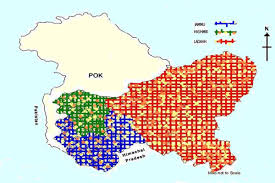Neither the Prime Minister, nor the Parliament of India can unilaterally redraw the borders of the state
Post Article 35A debate, a new story is doing rounds in the local newspapers and social networking spheres. The story headlines “PM Modi may trifurcate J&K in next one or two months”.
The news item claims that a report based on credible sources in the PM office said: “That Prime Minister NarendraModi wants to resolve the Jammu & Kashmir problem and could be gauged from the fact that he wants to resolve the Jammu & Kashmir issues during his first term itself. It is possible that he may himself in a month or so declare division of Jammu & Kashmir into three parts. According to top sources in the PMO, NarendraModi Government is working out a scheme that would lead to the state’s trifurcation. If all goes well, the Jammu & Kashmir’s map would be changed and Jammu, Kashmir and Ladakh would be created as Union Territories.”
This certainly is not the first time that such reports and debates have surfaced in political spheres and in print media. It would not be out of place to mention here that former Indian President, Late R Venkataraman(1987-92), had also told Prime Minister Indira Gandhi that the only viable solution to the problems in Jammu Kashmir was trifurcation of the state.
“Give statehood to Jammu, grant Union Territory status to Ladakh and deal with Kashmir separately,” was his suggestion to Indira Gandhi (My Presidential Years-A biography).
Again in 2002, RSS at its National Executive meeting in Kurukshetra adopted a resolution seeking a separate Jammu state, Union Territory status for Ladakh and rejecting autonomy for JK.
However the then Deputy Prime Minister, LK Advani rejected the RSS demand for trifurcation saying any such move would weaken India’s case on the Kashmir issue.
When asked about the RSS demand, he said: “The Govt is clear that there is no question of any division of Jammu and Kashmir and it does not favour any such action.”
The debate again gained momentum in the year 2016 when three ARJAC leaders demanded Union Territory status for Ladakh at a press conference.
Whether or not the present report is genuine but legally speaking it is not for the Prime Minister or the Parliament of India to make such unilateral declaration because the State in question is the State of Jammu Kashmir.
The State of Jammu Kashmir stands on a completely different footing as compared to the other states of the Union of India which can be understood from the following legal facts:
1) Article 3 authorizes the Parliament to:
(a) Form a new state by separation of territory from any state or by uniting two or more states or parts of states or by uniting any territory to a part of any state
(b) Increase the area of any state
(c) Diminish the area of any state
(d) Alter the boundaries of any state
(e) Alter the name of any state
The power of Parliament to form new states includes the power to form a new state or union territory by uniting a part of any state or union territory to any other state or union territory.
However, a bill contemplating the above changes can be introduced in the Parliament only with the prior recommendation of the President; and, before recommending the bill, the President has to refer the same to the state legislature concerned for expressing its views within a specified period.
Further, The President (or Parliament) is not bound by the views of the state legislature and may either accept or reject them, even if the views are received in time.
This Article 3 has been made applicable to the State of Jammu Kashmir by way of Presidential Order 1954 with an explicit proviso that no bill for the purpose of Article 3 shall be introduced in the Parliament without the “consent” of the legislature of the State.
Whereas in case of other states the President has only to ascertain the “views” of the concerned legislature before recommending the introduction of the bill relating to these matters and views offered by the state legislature are not binding.
Except for the State of Jammu Kashmir where prior consent is required, the Constitution empowers the Parliament to alter the territories of other states without their consent or concurrence.
2) In case the consent is obtained from a newly formed legislature and Parliament comes up with a JK Reorganisation Act, the Act itself cannot be made applicable to the State of JK because no Parliamentary Act can be applied to the State of JK unless the procedure provided by Article 370 is followed. The JK Reorganisation Act would need to be applied by way of a Presidential Order which will again require prior consultation and concurrence of the Government of JK.
3) In case the Parliament tries to invoke Article 253 in any way, again the proviso for Article 253 reads: “Provided that after the commencement of Presidential Order 1954, no decision affecting the disposition of the State of J&K shall be made by the Government of India without the consent of the Government of that State.”
Article 253 empowers the Parliament to make law for whole or any part of the territory of India for implementing any treaty, agreement or convention with any country or countries or any decision made at any international conference, association or other body.
However, if the agreement relates to the disposition of the territory of the State of Jammu Kashmir, it shall be made by the Government of India with the consent of the State Government.
This proviso also ensures that the Government of India cannot cede any part of the territory of the State of JK to a foreign country.
The boundaries of the State of Jammu Kashmir unlike other states are indestructible. The Constitution of India guarantees territorial integrity to the State of Jammu Kashmir and neither the Prime Minister, nor the Parliament of India can unilaterally redraw the borders of the state or declare it as one or three Union territories without taking the consent of the State.
Author is a research scholar at Department of Law, University of Kashmir
Syed Irfan Muhammad
syedirfan@kashmiruniversity.net





